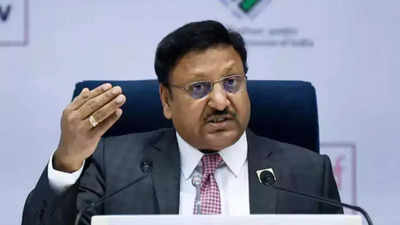
NEW DELHI: As chief election commissioner (CEC) Rajiv Kumar hung up his boots on Monday, he said the disturbing trend of Election Commission officials being unfairly blamed and made "convenient scapegoats' by parties and candidates unwilling to accept electoral outcomes should be "abandoned soon".
"All candidates and parties are involved in every stage of the process with utmost transparency. Having participated in each step, without raising objections or filing appeals during the process, and then attempting to create a doubt afterwards, is undesirable... while the commission reacts with sagacity, stoicism and restraint, this is a disturbing trend and should be abandoned soon," the outgoing chief election commissioner said in his farewell speech.
Kumar also suggested that judicial proceedings in cases challenging the electoral process be scheduled with due consideration to the election period, so that the conduct of polls remained smooth and undisturbed. "Live reporting of hearings in long-pending cases at critical junctures sometimes fuels distrust that the petitioner intends to create," he said, possibly referring to cases filed in the past by independent watchdogs questioning EVMs and EC's
voter turnout
data, being taken up for hearing mid-election.
Batting for
electoral reforms
that leverage technology as an enabler, Kumar said it was time to move forward with the pilot programme for remote voting and introduce NRI voting, which would help include nearly 300 million voters left out of the electoral process due to domestic and external migration. EC, he said, had explored the option of using a modified version of the EVM to enable voting at polling stations outside a migrant's home constituency. Recalling its concept note on remote voting shared with all recognised parties in Jan 2023, EC said efforts to build consensus must continue.
The inflexibility of a system that does not allow Indians to vote from anywhere within the country, irrespective of where they are registered as voters, leaves us with lakhs, possibly crores, of ballots that could have been cast but are not. TOI has been consistently highlighting this in its 'Lost Votes' campaign.
The outgoing CEC said necessary mechanisms have also been developed to enable NRIs to vote from outside the country and govt "should take a final decision" in the matter soon.
Kumar's reaction to post-poll criticism of EC's processes came against the background of parties like Congress, NCP-Sharad Pawar and Shiv Sena (UBT) alleging irregularities in updation of electoral rolls, voter turnout data, and EVM battery life following their defeat in Maharashtra and Haryana polls last year.
Pointing to a pattern in the timing of "false narratives", he said a wave of fake allegations and rumours were spread on social media during peak polling or counting hours, to mislead people and create confusion. Kumar lamented how hate speech was lowering the level of political discourse during elections, leaving scars that lasted well beyond the campaign. He called upon parties and their presidents to take responsibility for irresponsible utterances by their star campaigners.
While pitching for use of AI and digital tools in more efficient management of poll logistics and operations, Kumar at the same time flagged potential cyber threats and disinformation campaigns with AI-generated content. He asked social media companies to introspect and uphold free speech while ensuring that it did not become a casualty of their own algorithmic shortcomings. "Timely detention and labelling of misinformation are crucial to check its spread," he insisted.
He suggested introducing biometric authentication of voters to prevent impersonation and multiple voting, as well as totaliser machines to rule out the possibility of post-election violence, victimisation and exclusion of supporters of opposition parties from development activities.
.png)
 German (DE)
German (DE)  English (US)
English (US)  Spanish (ES)
Spanish (ES)  French (FR)
French (FR)  Hindi (IN)
Hindi (IN)  Italian (IT)
Italian (IT)  Russian (RU)
Russian (RU)  6 days ago
8
6 days ago
8









Comments